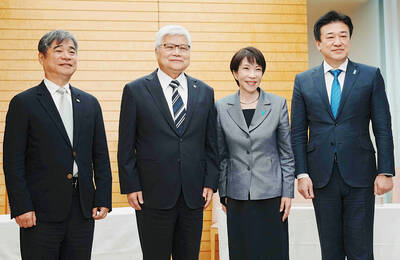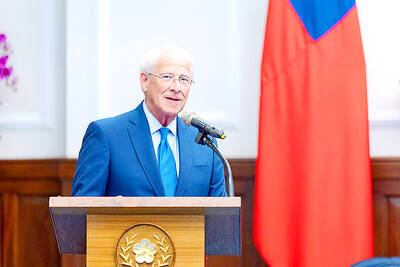Sales of life insurance policies for children under 14 years old is likely to be banned once an amendment to the Insurance Law (保險法) is passed in the legislature in the near future.
According to an agreement reached between Finance Minister Yen Ching-chang (
The ministry and legislators agreed on Tuesday that insurance companies cannot underwrite a life insurance policy for a minor until the he or she is at least 14 years old.
The Insurance Law amendment is likely to pass its third reading during the current session, after being idle in the legislature since it was proposed in late 1999 by New Party legislator Hsieh Chi-ta (謝啟大).
Since the sale of children's insurance policies has been an important money earner for life insurers, Hsieh's proposal to ban policies for children was strongly opposed by a number of large life insurance companies, represented by the Association of Life Insurance Companies (
The proposed ban stems from one lawmaker's concern that the policies offer the possibility for a `moral hazard,' where financially desperate parents buy the insurance only to resort to murdering their offspring to collect insurance premiums.
Life insurers claimed that the chance of this scenario taking place in Taiwan is minimal, and that it should not be banned for that reason.
Historically, there is only one recorded case in Taiwan of a parent murdering their child to claim insurance compensation, and that was more than three decades ago. But similar cases have been discovered in western countries in recent years.
However, Hsieh maintained her strong opposition to the policies by insisting that it's immoral to sell an insurance product that might endanger children's safety. Hsieh insists that while insurance products for children, such as accident insurance, should be allowed, life insurance policies for kids are just plain wrong.
Hsieh has been active in the protection of children's welfare for several years.
Meanwhile, according to one pundit, it seems that both sides have compromised on the issue.
"The reason behind the confrontation over the children's policy is that there have not been enough [profitable] insurance products to sell," said Henry Cheng (鄭百亨), managing director of Manulife Funds Direct, which is an affiliate of Manulife Insurance Co (宏利人壽).
"The finance ministry has been deregulating insurance products in recent months, especially insurance policies combined with investment vehicles, which should be very attractive to local consumers. Since there are going to be a lot more insurance products available for life insurers to sell, I think it's likely that they will not insist on selling children's life insurance policies," Cheng added.
The finance ministry has approved more than a dozen new insurance policies this year, which has never happened before. "Anticipating Taiwan's entry into the WTO, the country's insurance regulatory agency has launched its deregulation without announcing it publicly. The pace is likely to accelerate after the Insurance Law is revised," Cheng said.

Right-wing political scientist Laura Fernandez on Sunday won Costa Rica’s presidential election by a landslide, after promising to crack down on rising violence linked to the cocaine trade. Fernandez’s nearest rival, economist Alvaro Ramos, conceded defeat as results showed the ruling party far exceeding the threshold of 40 percent needed to avoid a runoff. With 94 percent of polling stations counted, the political heir of outgoing Costa Rican President Rodrigo Chaves had captured 48.3 percent of the vote compared with Ramos’ 33.4 percent, the Supreme Electoral Tribunal said. As soon as the first results were announced, members of Fernandez’s Sovereign People’s Party

Taiwan Semiconductor Manufacturing Co (TSMC, 台積電) plans to make advanced 3-nanometer chips in Japan, stepping up its semiconductor manufacturing roadmap in the country in a triumph for Japanese Prime Minister Sanae Takaichi’s technology ambitions. TSMC is to adopt cutting-edge technology for its second wafer fab in Kumamoto, company chairman C.C. Wei (魏哲家) said yesterday. That is an upgrade from an original blueprint to produce 7-nanometer chips by late next year, people familiar with the matter said. TSMC began mass production at its first plant in Japan’s Kumamoto in late 2024. Its second fab, which is still under construction, was originally focused on

EMERGING FIELDS: The Chinese president said that the two countries would explore cooperation in green technology, the digital economy and artificial intelligence Chinese President Xi Jinping (習近平) yesterday called for an “equal and orderly multipolar world” in the face of “unilateral bullying,” in an apparent jab at the US. Xi was speaking during talks in Beijing with Uruguayan President Yamandu Orsi, the first South American leader to visit China since US special forces captured then-Venezuelan president Nicolas Maduro last month — an operation that Beijing condemned as a violation of sovereignty. Orsi follows a slew of leaders to have visited China seeking to boost ties with the world’s second-largest economy to hedge against US President Donald Trump’s increasingly unpredictable administration. “The international situation is fraught

Opposition parties not passing defense funding harms Taiwan’s national security, two US senators said separately in rare public criticism. “I am disappointed to see Taiwan’s opposition parties in parliament [the legislature] slash President [William] Lai’s (賴清德) defense budget so dramatically,” Roger Wicker, a Republican who chairs the US Senate Armed Forces Committee, said on social media. “The original proposal funded urgently needed weapons systems. Taiwan’s parliament should reconsider — especially with rising Chinese threats,” he added. Wicker’s post linked to an article published by Bloomberg that said that the two opposition parties’ move was “potentially jeopardizing the purchases of billions of dollars of